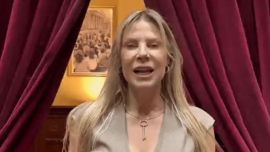Alberto Fernández’s global farewell tour is underway, with the head of state seeking a victory on the international stage to round off his Presidency.
Fernández, 64, flew to New Delhi Thursday for the G20 Leaders Summit in India, one of his last public appearances at a major global gathering. The meeting comes amid tension in the international community, with disagreements between the United States, China and Russia on clear display.
The president, according to government sources, will focus his contributions to the summit on environmental challenges (such as climate change, the loss of biodiversity and food and energy insecurity) and sustainable development, human rights and gender equality. The Peronist leader will also return to a key theme: the redrawing of the global financial architecture to assist developing nations.
The Télam state news agency reported that Fernándezwill hold a number of bilateral meetings with other presidens and prime ministers while in New Delhi, including the leaders of India, the United Arab Emirates, South Korea and Bangladesh.
The president’s last G20 summit will unfold under the motto "One earth, one family, one future." President Fernández is due to speak in both the first plenary session this morning and the second session this afternoon.
The event is an opportunity for the president to reassert himself and boost his profile. Since ceding large amounts of power to Economy Minister Sergio Massa in a Cabinet reshuffle last August and deciding not to run for re-election, his political standing has crumbled into irrelevance.
Also aboard the flight to India were Foreign Minister Santiago Cafiero, presidential chief-of-staff Julio Vitobello, presidential spokesperson Gabriela Cerruti and Argentina’s Ambassador to Washington Jorge Argüello, also acting as the nation’s G20 sherpa.
Chile, Cuba, UN
The president will be hastily leaving India Sunday afternoon in order to arrive in Chile in time for Monday’s commemoration of the 50th anniversary of Augusto Pinochet’s coup overthrowing and slaying the socialist president Salvador Allende.
Fernández will then only have a couple of days back home before resuming his international agenda with a flight to Havana to participate in the Summit of G77+China on September 15 and 16.
There the president will meet up with the United Nations Secretary-General Antonio Guterres and take part in the meeting of heads of state and government convened by Cuba (this year’s pro tem president of G77+China) to broach South-South co-operation in questions of innovation and development.
The final stop for Fernández in this month’s international agenda will be in New York where he will deliver his last address to the annual UN General Assembly to be held on September 20. Within this framework he will be holding several bilateral meetings with Spanish premier Pedro Sánchez already confirmed.
The president has further confirmed for early next month a trip to China to participate in a summit of heads of state convened by his Chinese counterpart Xi Jinping.
Off to New Delhi
G20 heads of state will descend on New Delhi as from Friday, with host Prime Minister Narendra Modi seizing a chance to occupy the geopolitical centre stage and hammer home India's growing diplomatic clout.
Around the summit table, there will be a few notable absences – with Chinese leader Xi Jinping and Russia's Vladimir Putin both opting to stay at home.
Deep disagreements on Russia's war in Ukraine, the phasing out of fossil fuels and debt restructuring will make any agreements at the end of the two-day meeting difficult to come by.
But sensing an opportunity to burnish his credentials as a statesman ahead of a re-election tilt early next year, Modi has thrust himself into any void left by Xi or Putin.
Sumedha Dasgupta, senior Asia analyst with the Economist Intelligence Unit, believes that "India will try to be a credible voice that can facilitate dialogue between the global north and south."
India, fresh from celebrating the cementing of its position as a space power by landing a craft on the Moon in August, has portrayed its hosting of the G20 as a coming-of-age moment that makes it a key global player.
Divisions
Modi has tried to use the G20 to build consensus among key economies to reform global multilateral institutions like the United Nations to give a greater say to developing countries such as India, Brazil and South Africa.
But with China represented by Premier Li Qiang rather than Xi, it is far from clear what, if anything, can be agreed.
Representatives from 20 leading economies are gathering in the Indian capital at a time of intense trade tensions between the world's two largest economies, China and the United States.
The grouping is also split over Russia's invasion of Ukraine, with many developing members more concerned with high grain prices than joining diplomatic condemnations of Moscow's behaviour.
– TIMES/NA/AFP



















Comments